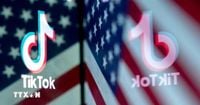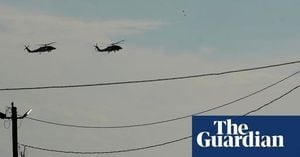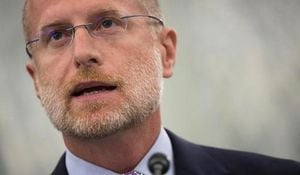In a move that could reshape the digital landscape and U.S.-China tech relations, the White House announced on September 21, 2025, that an agreement over the future of TikTok’s American operations has been finalized. The deal, which has been months in the making and closely watched by millions of TikTok users and policymakers alike, places the popular short-video app under new leadership and technical oversight, with the United States asserting majority control over its algorithm, data, and privacy for users within its borders.
Speaking on Fox News, White House Press Secretary Karoline Leavitt confirmed, “The agreement has been completed. President Donald Trump’s team is now working with Chinese partners to sign the agreement, possibly in the coming days.” According to Leavitt, the U.S. will control TikTok’s algorithm, and American tech giant Oracle will be entrusted with the app’s data and privacy operations for its U.S. users.
The specifics of the deal, as detailed by both Fox News and Reuters, mark a significant shift in the governance of TikTok’s American business. The management board of TikTok in the U.S. will expand to seven seats, of which six will be held by Americans, ensuring an American majority. The remaining seat, and a potential 20% stake, may be retained by Chinese investors, maintaining a connection to TikTok’s parent company, ByteDance. This new structure is designed to address longstanding national security concerns voiced by U.S. officials, who have repeatedly warned that ByteDance could be compelled to share American user data with the Chinese government—a claim that TikTok has consistently denied.
Under the terms of the agreement, all data from TikTok’s estimated 170 million U.S. users will be stored on American cloud systems operated by Oracle. This move, the White House says, will ensure that TikTok’s algorithm is secured, modified, and operated within the United States, effectively placing it outside the reach of ByteDance and, by extension, Chinese authorities. Leavitt emphasized, “The TikTok algorithm will be controlled by the United States, and data and privacy for the app in the U.S. will be managed by Oracle.”
The deal is being steered by a consortium of American investors, including Oracle, Andreessen Horowitz, and Silver Lake, who are expected to take the lead once the agreement is officially signed. The Wall Street Journal reported that the U.S. government could receive fees amounting to several billion dollars from these investors as part of the arrangement, although the exact financial details remain undisclosed.
The agreement’s path to completion has been anything but straightforward. On September 20, President Trump revealed that he and Chinese President Xi Jinping had made progress on the TikTok deal during a phone call, with Trump stating that Xi had “approved” the agreement. However, Chinese officials have not yet publicly confirmed any such approval, leaving some uncertainty about Beijing’s final stance on the matter.
The backdrop to this high-stakes negotiation is a years-long tug-of-war over TikTok’s presence in the United States. Under President Joe Biden’s administration, Congress passed legislation mandating that ByteDance must divest its U.S. TikTok operations or face a nationwide ban. The rationale, according to American lawmakers, was to protect national security and prevent the possibility of American user data being accessed by the Chinese government. Despite TikTok’s repeated denials of data-sharing allegations, the pressure mounted. On September 16, President Trump signed a fourth extension to the looming ban, allowing TikTok to continue operating in the U.S. until December 16, 2025—the new deadline for ByteDance to complete its divestment.
The stakes are enormous. TikTok is one of the most popular social media platforms in the United States, with a user base that spans generations and demographics. Its influence on culture, politics, and business is undeniable, and any disruption to its operations would be felt across the digital ecosystem. For ByteDance, the parent company headquartered in China, the U.S. market represents both a lucrative opportunity and a persistent regulatory challenge.
American officials have long argued that TikTok poses a national security risk. The core of their concern is the company’s Chinese ownership and the country’s laws that could, in theory, force ByteDance to hand over data to the Chinese government. As the Wall Street Journal noted, “U.S. officials have expressed concerns about TikTok’s potential national security risks due to ByteDance’s data sharing with China, which TikTok has denied.” TikTok, for its part, has steadfastly rejected these accusations, insisting that it has never shared U.S. user data with Chinese authorities and would not do so if asked.
The new agreement aims to put those fears to rest by placing TikTok’s American operations under a governance structure dominated by U.S. citizens and subjecting its data and algorithm to American oversight. The role of Oracle is particularly noteworthy; as a trusted American tech company, Oracle is expected to provide the technical infrastructure and safeguards necessary to keep user data secure and private. “Oracle will be responsible for data and privacy, with the TikTok algorithm controlled by the U.S.,” Leavitt reiterated in her Fox News interview.
Yet, even as the agreement appears poised for signing, questions remain. Will China ultimately approve the arrangement, or could Beijing impose its own conditions or restrictions? What will happen to TikTok’s global operations, and could this deal serve as a template for other countries grappling with similar concerns over Chinese technology companies? And perhaps most pressing of all for TikTok’s millions of American fans: will the app’s user experience change as a result of these sweeping governance reforms?
Meanwhile, the clock is ticking. The current extension on TikTok’s operations in the U.S. expires on December 16, 2025, giving ByteDance and its American partners less than three months to finalize the divestment and implement the new management structure. If the deal falls through or fails to meet U.S. government requirements, a nationwide ban on TikTok could be back on the table—a prospect that would send shockwaves through the social media industry.
For now, though, the mood among American officials appears cautiously optimistic. The agreement, if successfully executed, could mark the end of a long and contentious chapter in U.S.-China tech relations. It would also set a precedent for how major international technology companies might be regulated and governed in the future, especially when concerns over data privacy and national security are at stake.
As the ink dries on this landmark deal, all eyes will be on Washington, Beijing, and Silicon Valley to see whether this new approach to tech governance can deliver both security and innovation in an increasingly interconnected world.




